Hongda Sun
From Retrieval to Reasoning: A Framework for Cyber Threat Intelligence NER with Explicit and Adaptive Instructions
Dec 22, 2025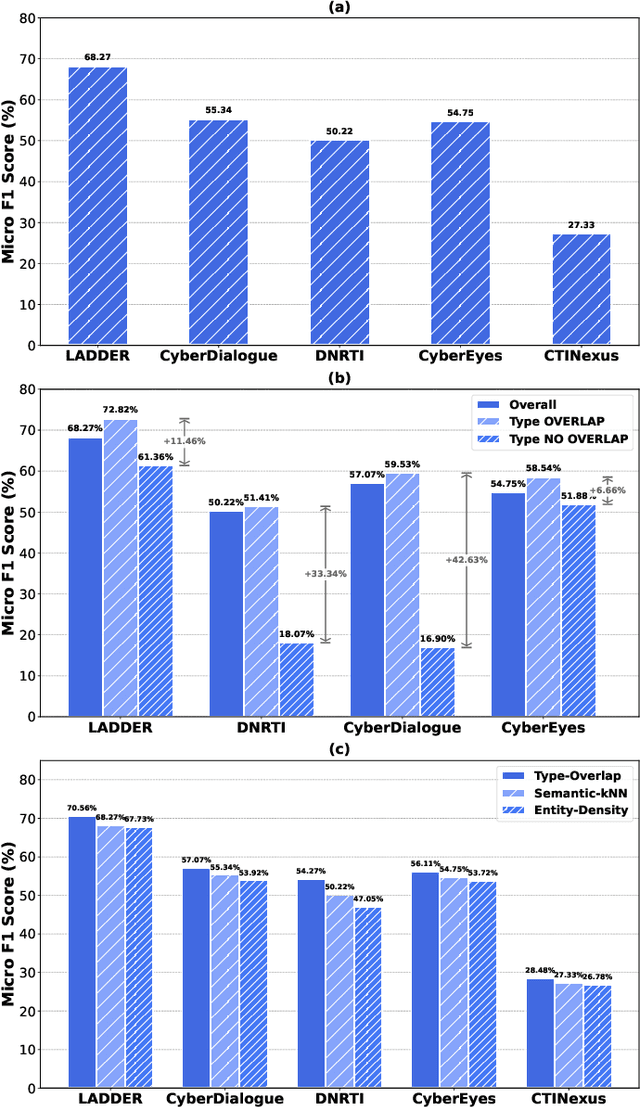
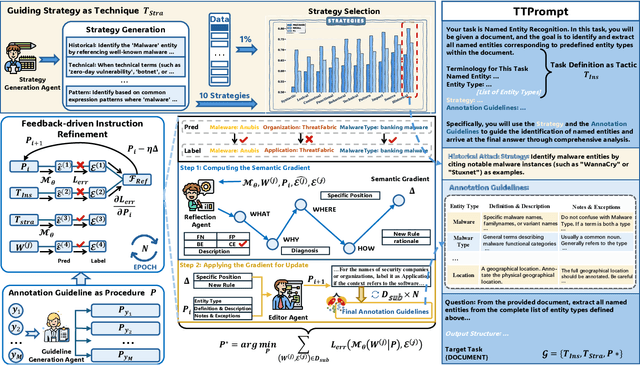
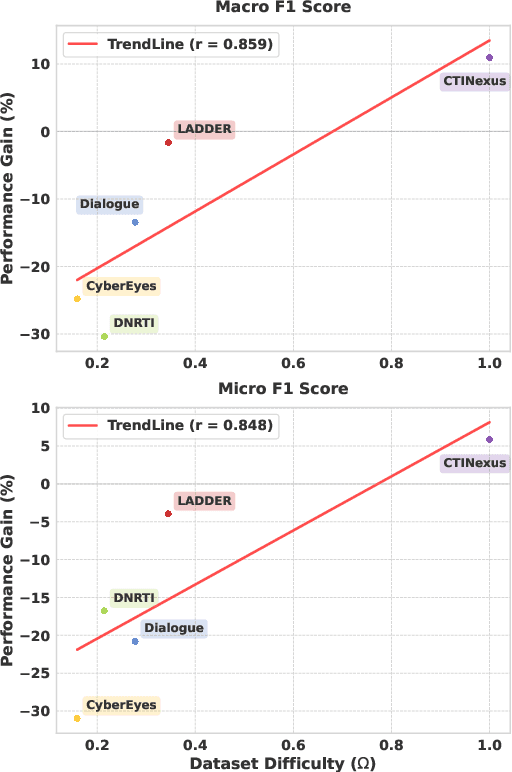
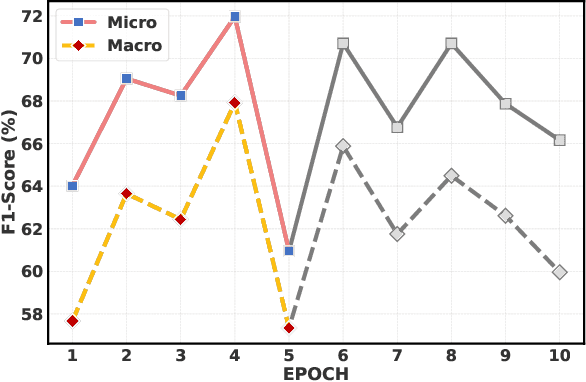
Abstract:The automation of Cyber Threat Intelligence (CTI) relies heavily on Named Entity Recognition (NER) to extract critical entities from unstructured text. Currently, Large Language Models (LLMs) primarily address this task through retrieval-based In-Context Learning (ICL). This paper analyzes this mainstream paradigm, revealing a fundamental flaw: its success stems not from global semantic similarity but largely from the incidental overlap of entity types within retrieved examples. This exposes the limitations of relying on unreliable implicit induction. To address this, we propose TTPrompt, a framework shifting from implicit induction to explicit instruction. TTPrompt maps the core concepts of CTI's Tactics, Techniques, and Procedures (TTPs) into an instruction hierarchy: formulating task definitions as Tactics, guiding strategies as Techniques, and annotation guidelines as Procedures. Furthermore, to handle the adaptability challenge of static guidelines, we introduce Feedback-driven Instruction Refinement (FIR). FIR enables LLMs to self-refine guidelines by learning from errors on minimal labeled data, adapting to distinct annotation dialects. Experiments on five CTI NER benchmarks demonstrate that TTPrompt consistently surpasses retrieval-based baselines. Notably, with refinement on just 1% of training data, it rivals models fine-tuned on the full dataset. For instance, on LADDER, its Micro F1 of 71.96% approaches the fine-tuned baseline, and on the complex CTINexus, its Macro F1 exceeds the fine-tuned ACLM model by 10.91%.
Enhancing Medical Dialogue Generation through Knowledge Refinement and Dynamic Prompt Adjustment
Jun 12, 2025Abstract:Medical dialogue systems (MDS) have emerged as crucial online platforms for enabling multi-turn, context-aware conversations with patients. However, existing MDS often struggle to (1) identify relevant medical knowledge and (2) generate personalized, medically accurate responses. To address these challenges, we propose MedRef, a novel MDS that incorporates knowledge refining and dynamic prompt adjustment. First, we employ a knowledge refining mechanism to filter out irrelevant medical data, improving predictions of critical medical entities in responses. Additionally, we design a comprehensive prompt structure that incorporates historical details and evident details. To enable real-time adaptability to diverse patient conditions, we implement two key modules, Triplet Filter and Demo Selector, providing appropriate knowledge and demonstrations equipped in the system prompt. Extensive experiments on MedDG and KaMed benchmarks show that MedRef outperforms state-of-the-art baselines in both generation quality and medical entity accuracy, underscoring its effectiveness and reliability for real-world healthcare applications.
MobileSteward: Integrating Multiple App-Oriented Agents with Self-Evolution to Automate Cross-App Instructions
Feb 24, 2025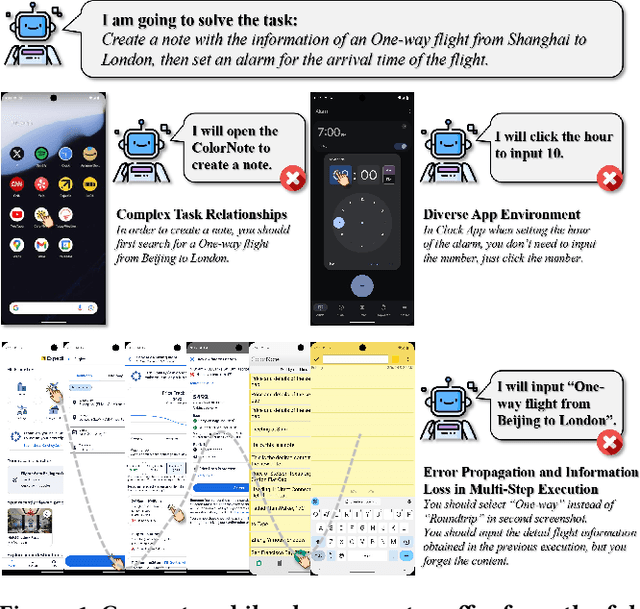
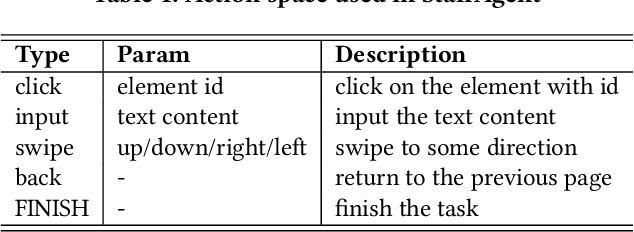
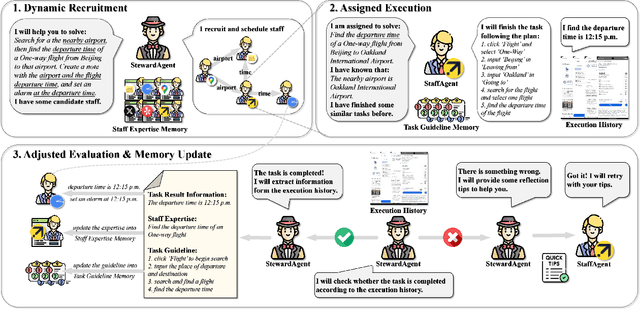
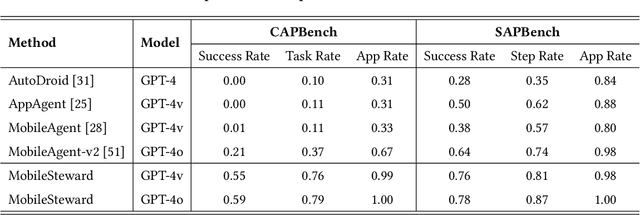
Abstract:Mobile phone agents can assist people in automating daily tasks on their phones, which have emerged as a pivotal research spotlight. However, existing procedure-oriented agents struggle with cross-app instructions, due to the following challenges: (1) complex task relationships, (2) diverse app environment, and (3) error propagation and information loss in multi-step execution. Drawing inspiration from object-oriented programming principles, we recognize that object-oriented solutions is more suitable for cross-app instruction. To address these challenges, we propose a self-evolving multi-agent framework named MobileSteward, which integrates multiple app-oriented StaffAgents coordinated by a centralized StewardAgent. We design three specialized modules in MobileSteward: (1) Dynamic Recruitment generates a scheduling graph guided by information flow to explicitly associate tasks among apps. (2) Assigned Execution assigns the task to app-oriented StaffAgents, each equipped with app-specialized expertise to address the diversity between apps. (3) Adjusted Evaluation conducts evaluation to provide reflection tips or deliver key information, which alleviates error propagation and information loss during multi-step execution. To continuously improve the performance of MobileSteward, we develop a Memory-based Self-evolution mechanism, which summarizes the experience from successful execution, to improve the performance of MobileSteward. We establish the first English Cross-APP Benchmark (CAPBench) in the real-world environment to evaluate the agents' capabilities of solving complex cross-app instructions. Experimental results demonstrate that MobileSteward achieves the best performance compared to both single-agent and multi-agent frameworks, highlighting the superiority of MobileSteward in better handling user instructions with diverse complexity.
BiDeV: Bilateral Defusing Verification for Complex Claim Fact-Checking
Feb 22, 2025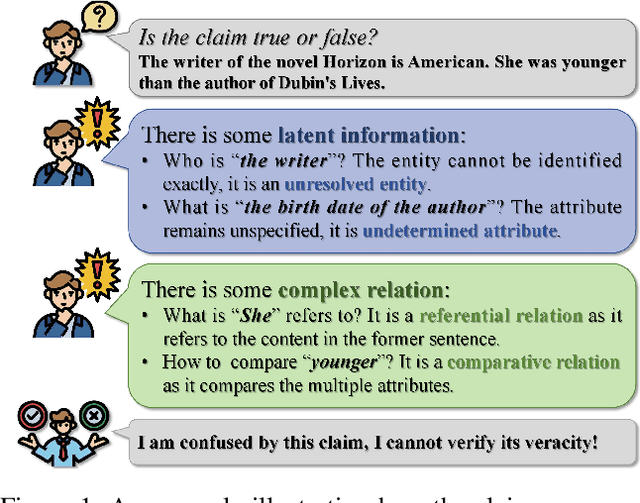

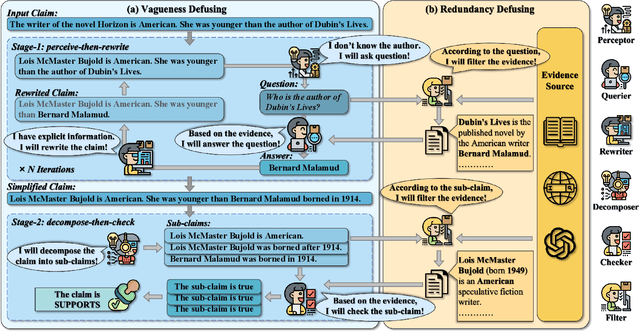
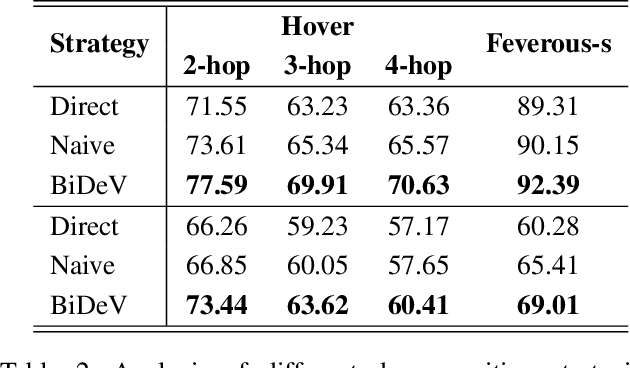
Abstract:Complex claim fact-checking performs a crucial role in disinformation detection. However, existing fact-checking methods struggle with claim vagueness, specifically in effectively handling latent information and complex relations within claims. Moreover, evidence redundancy, where nonessential information complicates the verification process, remains a significant issue. To tackle these limitations, we propose Bilateral Defusing Verification (BiDeV), a novel fact-checking working-flow framework integrating multiple role-played LLMs to mimic the human-expert fact-checking process. BiDeV consists of two main modules: Vagueness Defusing identifies latent information and resolves complex relations to simplify the claim, and Redundancy Defusing eliminates redundant content to enhance the evidence quality. Extensive experimental results on two widely used challenging fact-checking benchmarks (Hover and Feverous-s) demonstrate that our BiDeV can achieve the best performance under both gold and open settings. This highlights the effectiveness of BiDeV in handling complex claims and ensuring precise fact-checking
One Small and One Large for Document-level Event Argument Extraction
Nov 08, 2024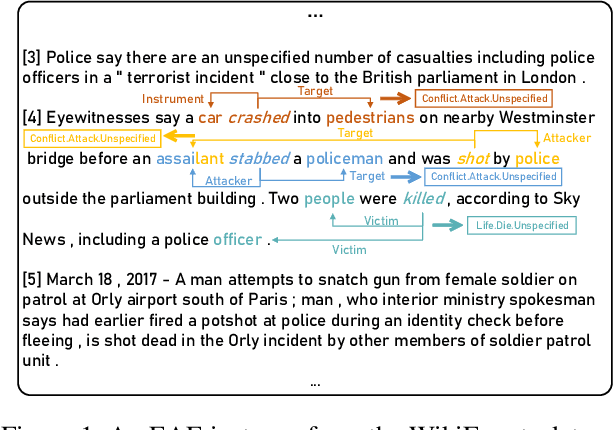

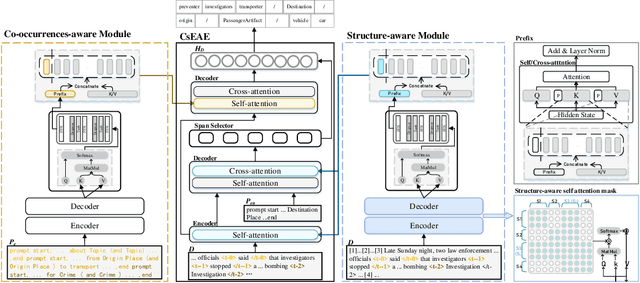
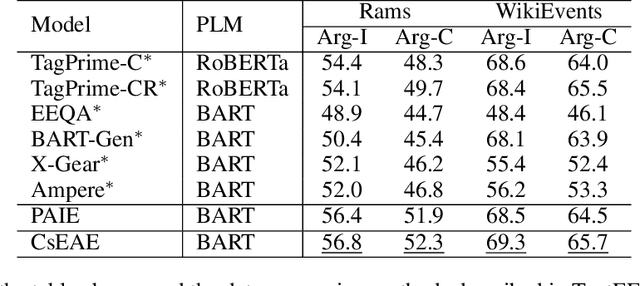
Abstract:Document-level Event Argument Extraction (EAE) faces two challenges due to increased input length: 1) difficulty in distinguishing semantic boundaries between events, and 2) interference from redundant information. To address these issues, we propose two methods. The first method introduces the Co and Structure Event Argument Extraction model (CsEAE) based on Small Language Models (SLMs). CsEAE includes a co-occurrences-aware module, which integrates information about all events present in the current input through context labeling and co-occurrences event prompts extraction. Additionally, CsEAE includes a structure-aware module that reduces interference from redundant information by establishing structural relationships between the sentence containing the trigger and other sentences in the document. The second method introduces new prompts to transform the extraction task into a generative task suitable for Large Language Models (LLMs), addressing gaps in EAE performance using LLMs under Supervised Fine-Tuning (SFT) conditions. We also fine-tuned multiple datasets to develop an LLM that performs better across most datasets. Finally, we applied insights from CsEAE to LLMs, achieving further performance improvements. This suggests that reliable insights validated on SLMs are also applicable to LLMs. We tested our models on the Rams, WikiEvents, and MLEE datasets. The CsEAE model achieved improvements of 2.1\%, 2.3\%, and 3.2\% in the Arg-C F1 metric compared to the baseline, PAIE~\cite{PAIE}. For LLMs, we demonstrated that their performance on document-level datasets is comparable to that of SLMs~\footnote{All code is available at https://github.com/simon-p-j-r/CsEAE}.
Mobile-Bench: An Evaluation Benchmark for LLM-based Mobile Agents
Jul 01, 2024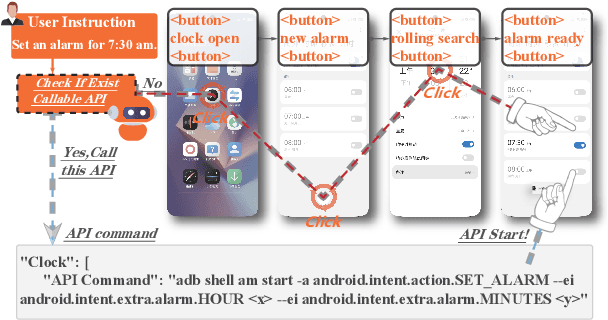

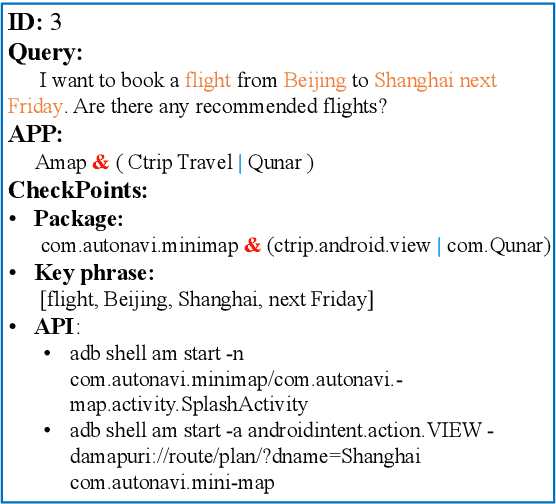
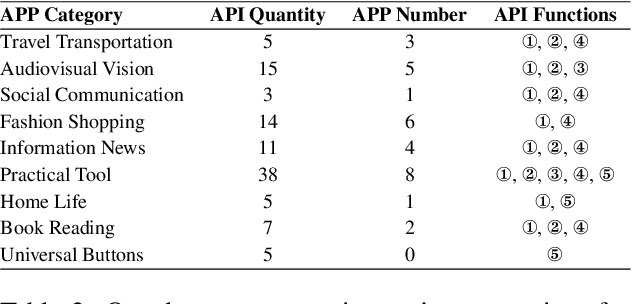
Abstract:With the remarkable advancements of large language models (LLMs), LLM-based agents have become a research hotspot in human-computer interaction. However, there is a scarcity of benchmarks available for LLM-based mobile agents. Benchmarking these agents generally faces three main challenges: (1) The inefficiency of UI-only operations imposes limitations to task evaluation. (2) Specific instructions within a singular application lack adequacy for assessing the multi-dimensional reasoning and decision-making capacities of LLM mobile agents. (3) Current evaluation metrics are insufficient to accurately assess the process of sequential actions. To this end, we propose Mobile-Bench, a novel benchmark for evaluating the capabilities of LLM-based mobile agents. First, we expand conventional UI operations by incorporating 103 collected APIs to accelerate the efficiency of task completion. Subsequently, we collect evaluation data by combining real user queries with augmentation from LLMs. To better evaluate different levels of planning capabilities for mobile agents, our data is categorized into three distinct groups: SAST, SAMT, and MAMT, reflecting varying levels of task complexity. Mobile-Bench comprises 832 data entries, with more than 200 tasks specifically designed to evaluate multi-APP collaboration scenarios. Furthermore, we introduce a more accurate evaluation metric, named CheckPoint, to assess whether LLM-based mobile agents reach essential points during their planning and reasoning steps.
Facilitating Multi-Role and Multi-Behavior Collaboration of Large Language Models for Online Job Seeking and Recruiting
May 28, 2024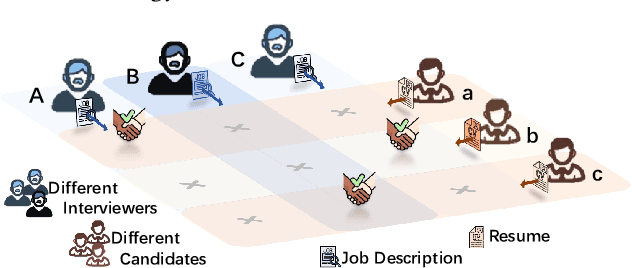
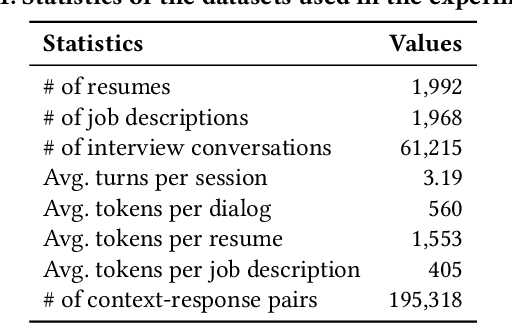
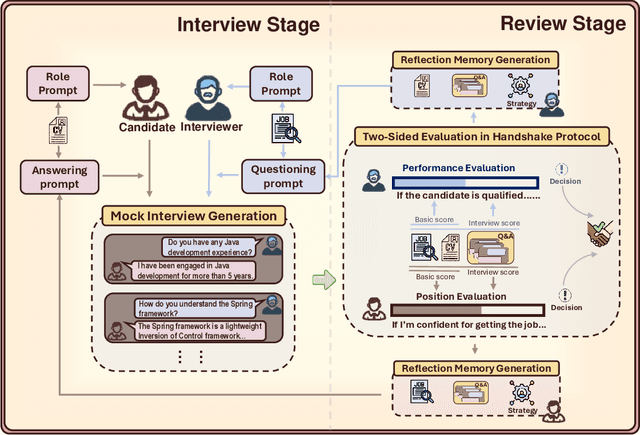

Abstract:The emergence of online recruitment services has revolutionized the traditional landscape of job seeking and recruitment, necessitating the development of high-quality industrial applications to improve person-job fitting. Existing methods generally rely on modeling the latent semantics of resumes and job descriptions and learning a matching function between them. Inspired by the powerful role-playing capabilities of Large Language Models (LLMs), we propose to introduce a mock interview process between LLM-played interviewers and candidates. The mock interview conversations can provide additional evidence for candidate evaluation, thereby augmenting traditional person-job fitting based solely on resumes and job descriptions. However, characterizing these two roles in online recruitment still presents several challenges, such as developing the skills to raise interview questions, formulating appropriate answers, and evaluating two-sided fitness. To this end, we propose MockLLM, a novel applicable framework that divides the person-job matching process into two modules: mock interview generation and two-sided evaluation in handshake protocol, jointly enhancing their performance through collaborative behaviors between interviewers and candidates. We design a role-playing framework as a multi-role and multi-behavior paradigm to enable a single LLM agent to effectively behave with multiple functions for both parties. Moreover, we propose reflection memory generation and dynamic prompt modification techniques to refine the behaviors of both sides, enabling continuous optimization of the augmented additional evidence. Extensive experimental results show that MockLLM can achieve the best performance on person-job matching accompanied by high mock interview quality, envisioning its emerging application in real online recruitment in the future.
Harnessing Multi-Role Capabilities of Large Language Models for Open-Domain Question Answering
Mar 08, 2024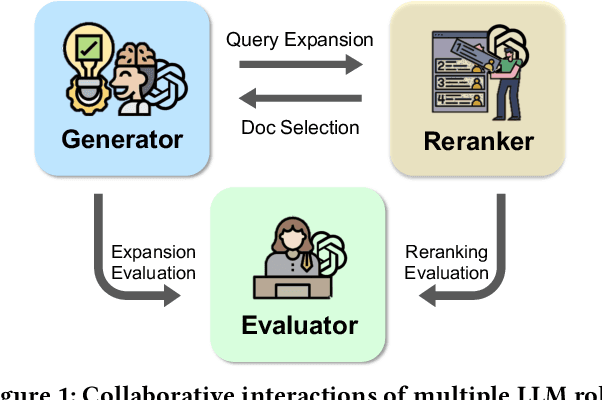
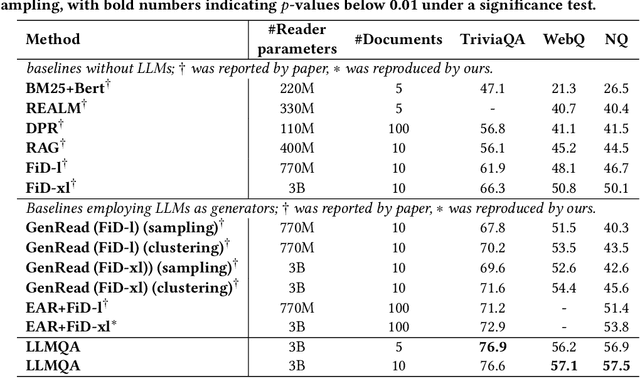
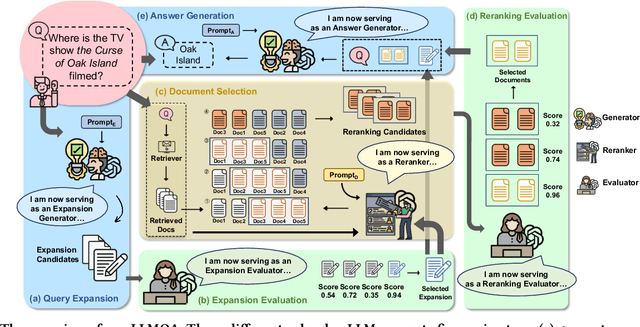

Abstract:Open-domain question answering (ODQA) has emerged as a pivotal research spotlight in information systems. Existing methods follow two main paradigms to collect evidence: (1) The \textit{retrieve-then-read} paradigm retrieves pertinent documents from an external corpus; and (2) the \textit{generate-then-read} paradigm employs large language models (LLMs) to generate relevant documents. However, neither can fully address multifaceted requirements for evidence. To this end, we propose LLMQA, a generalized framework that formulates the ODQA process into three basic steps: query expansion, document selection, and answer generation, combining the superiority of both retrieval-based and generation-based evidence. Since LLMs exhibit their excellent capabilities to accomplish various tasks, we instruct LLMs to play multiple roles as generators, rerankers, and evaluators within our framework, integrating them to collaborate in the ODQA process. Furthermore, we introduce a novel prompt optimization algorithm to refine role-playing prompts and steer LLMs to produce higher-quality evidence and answers. Extensive experimental results on widely used benchmarks (NQ, WebQ, and TriviaQA) demonstrate that LLMQA achieves the best performance in terms of both answer accuracy and evidence quality, showcasing its potential for advancing ODQA research and applications.
Collaborative Synthesis of Patient Records through Multi-Visit Health State Inference
Dec 22, 2023Abstract:Electronic health records (EHRs) have become the foundation of machine learning applications in healthcare, while the utility of real patient records is often limited by privacy and security concerns. Synthetic EHR generation provides an additional perspective to compensate for this limitation. Most existing methods synthesize new records based on real EHR data, without consideration of different types of events in EHR data, which cannot control the event combinations in line with medical common sense. In this paper, we propose MSIC, a Multi-visit health Status Inference model for Collaborative EHR synthesis to address these limitations. First, we formulate the synthetic EHR generation process as a probabilistic graphical model and tightly connect different types of events by modeling the latent health states. Then, we derive a health state inference method tailored for the multi-visit scenario to effectively utilize previous records to synthesize current and future records. Furthermore, we propose to generate medical reports to add textual descriptions for each medical event, providing broader applications for synthesized EHR data. For generating different paragraphs in each visit, we incorporate a multi-generator deliberation framework to collaborate the message passing of multiple generators and employ a two-phase decoding strategy to generate high-quality reports. Our extensive experiments on the widely used benchmarks, MIMIC-III and MIMIC-IV, demonstrate that MSIC advances state-of-the-art results on the quality of synthetic data while maintaining low privacy risks.
From Indeterminacy to Determinacy: Augmenting Logical Reasoning Capabilities with Large Language Models
Oct 28, 2023Abstract:Recent advances in LLMs have revolutionized the landscape of reasoning tasks. To enhance the capabilities of LLMs to emulate human reasoning, prior works focus on modeling reasoning steps using specific thought structures like chains, trees, or graphs. However, LLM-based reasoning continues to encounter three challenges: 1) Selecting appropriate reasoning structures for various tasks; 2) Exploiting known conditions sufficiently and efficiently to deduce new insights; 3) Considering the impact of historical reasoning experience. To address these challenges, we propose DetermLR, a novel reasoning framework that formulates the reasoning process as a transformational journey from indeterminate premises to determinate ones. This process is marked by the incremental accumulation of determinate premises, making the conclusion progressively closer to clarity. DetermLR includes three essential components: 1) Premise identification: We categorize premises into two distinct types: determinate and indeterminate. This empowers LLMs to customize reasoning structures to match the specific task complexities. 2) Premise prioritization and exploration: We leverage quantitative measurements to assess the relevance of each premise to the target, prioritizing more relevant premises for exploring new insights. 3) Iterative process with reasoning memory: We introduce a reasoning memory module to automate storage and extraction of available premises and reasoning paths, preserving historical reasoning details for more accurate premise prioritization. Comprehensive experimental results show that DetermLR outperforms all baselines on four challenging logical reasoning tasks: LogiQA, ProofWriter, FOLIO, and LogicalDeduction. DetermLR can achieve better reasoning performance while requiring fewer visited states, highlighting its superior efficiency and effectiveness in tackling logical reasoning tasks.
 Add to Chrome
Add to Chrome Add to Firefox
Add to Firefox Add to Edge
Add to Edge